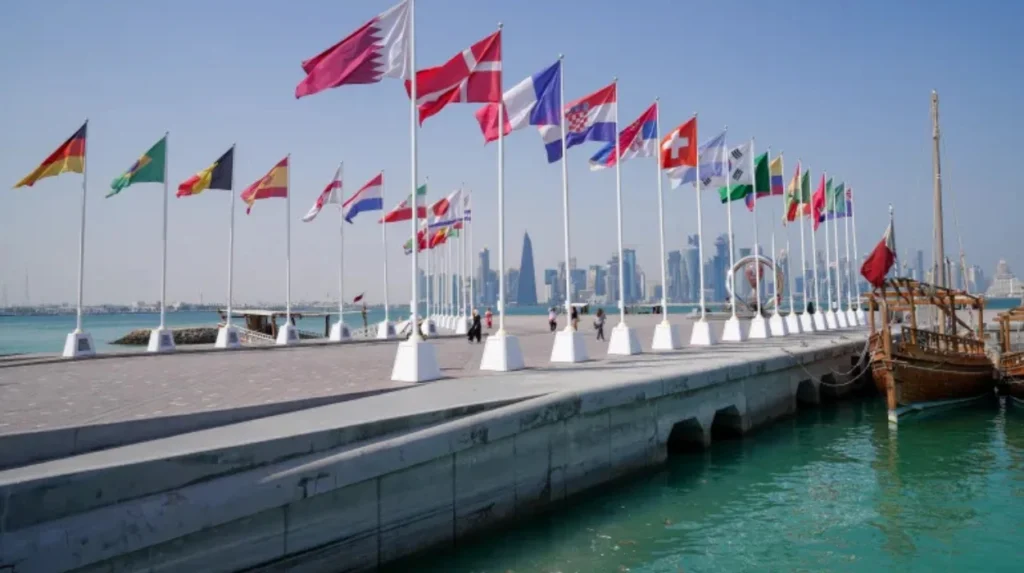The football universe has always claimed to be above politics, embracing unity, passion, and global brotherhood. But giving the right to host international events like the FIFA World Cup is not just a question of infrastructure or sport. It is a political decision with far-reaching implications.
The latest statements of the Saudi foreign minister regarding the Gaza war add yet another layered complexity to this point. On the surface, Saudi Arabia appears to take a mediating stance, calling for a permanent end to hostilities in Gaza and against Israeli bombing. But there is a conflicting reality behind all these words that cannot be sidestepped by the global footballing world.
Saudi Gaza Stand: A Calculated Charade?
On 4 July 2024, during a visit to Moscow, Saudi Foreign Minister Prince Faisal bin Farhan Al-Saud stated that the
“current priority of the Kingdom is achieving a permanent ceasefire in Gaza.”
He insisted that normalization of relations with Israel is not on the agenda while the Palestinian question is open, fearing the horrific civilian toll in Gaza.
He continued to state,
“What we’re seeing is the Israelis are destroying Gaza, the civilian population of Gaza. This is completely unnecessary, completely unacceptable and must be stopped.”
This claim, admirable as it sounds, must be read with a skeptical eye. Saudi Arabia’s geopolitical interests have long consisted of hedging alliances with the West, strategic ambiguity on certain human rights issues, and selective moral virtue. While it would be popular with the international masses to call for a ceasefire, it does not absolve Saudi Arabia of its own faults—most notably in the light of its human rights record, authoritarian leadership, and history of military intervention, including the war in Yemen.
The Sportswashing Hypocrisy of Saudi Arabia
Saudi Arabia’s bid for the 2034 FIFA World Cup is not purely sporting. It is part of a broader initiative known as sportswashing—using foreign sports to whitewash the country’s global reputation. Formula 1 racing, LIV Golf, heavyweight boxing matches, and the World Cup now are all maneuvers in a staged attempt to take the spotlight away from mass domestic repression and regional controversy.
The Gaza crisis and Saudi Arabia’s role or stance therein cannot be considered in isolation. It is instead reflective of the Kingdom’s efforts to remake itself while holding on to authoritarian grip locally and morally questionable foreign policies globally. How could we, in good faith, rejoice in football—a game of peace, harmony, and equality—when played in a nation that suppresses opposition, curtails liberties, and employs sports as a smokescreen?
Human Rights Violations at Home
Saudi Arabia remains one of the most oppressive regimes on the planet. Amnesty International, Human Rights Watch, and countless independent observers continue to document an appalling roll call of abuses:
Crushing free speech: Activists, journalists, and even individuals in private life have been jailed or killed merely for showing dissent.
Practice of the death penalty: Public executions remain the norm, frequently for non-violent offenses.
No room for LGBTQ+ individuals: Homosexuality is banned and brutally punished during Eid.
Gender discrimination: Malaysia has undertaken some cosmetic changes, but Saudi women continue to face structural discrimination and restrictions on their liberties.
The Gaza Context and Global Solidarity
In the face of ongoing Gaza war—where over 57,000 Palestinians have died in Israeli strikes since October 7, according to the local health ministry—the world is asking for more than rhetoric from diplomacy. We require action, accountability, and real pressure on those who are justifying or failing to stop the carnage.
Saudi Arabia’s display of concern over Gaza’s civilians must be taken in context. If the Kingdom means business over justice and peace for Palestinians, it must do more than utter platitudes. It must put an end to any covert attempts at normalization, stop selling weapons that fund regional wars, and apply actual pressure on Israel and its sponsors.
Granting Saudi Arabia the 2034 World Cup right is a betrayal of such goals. It allows the Kingdom to claim moral leadership in the region when it itself is committing human rights violations and has questionable alliances with states that are resorting to military aggression.
Why FIFA Must Reconsider
FIFA has a moral and ethical obligation to represent the soul of the game. Its slogan—For the Game. For the World.—has no meaning if it permits authoritarian governments to host flashy tournaments while oppressing their own citizens and fighting regional war.
Let us remember that FIFA stripped South Africa of its hosting rights in apartheid. Why today is Saudi Arabia—whose repression is both internal and regional—being rewarded?
It’s time to take action. Human rights groups, football fans, civil society organizations, and national associations must unite in demanding that FIFA reverse its ruling. The World Cup is not a right you can host—it’s an honor reserved for those with the values of sport, not the exploitation of it for PR.
Here’s what we must do:
- Pressure FIFA: Target national football associations, players, and sponsors. Demand Saudi Arabia be put back in the running as a host.
- Raise awareness: Use social movements on social media, petitions, and public debate to shine a light on the hypocrisy between Saudi policies and those of FIFA.
- Promote alternatives: Encourage FIFA to consider democratic countries with proven human rights track records as possible alternative hosts.
The Game Belongs to the People, Not Authoritarians
The 2034 FIFA World Cup should be a celebration of humanity’s solidarity, not a victory for political spin doctors and autocrats. If Saudi Arabia’s recent Gaza statement was meant to signal a change of tone, words are not enough. Peace, justice, and human rights require action, accountability, and transparency—something that has been in short supply in Saudi Arabia’s governance.

